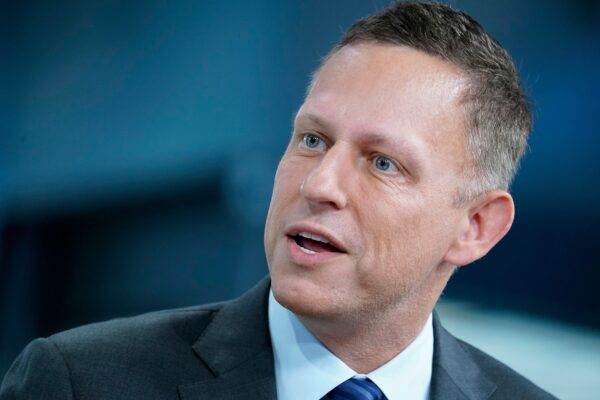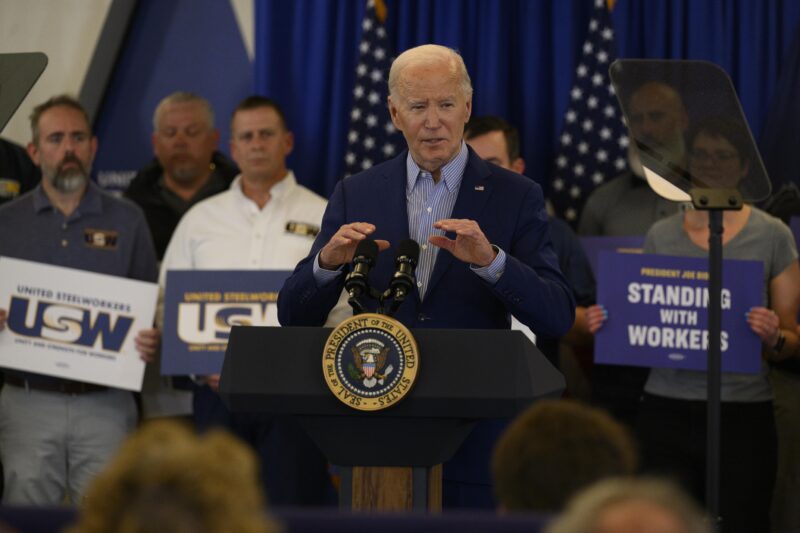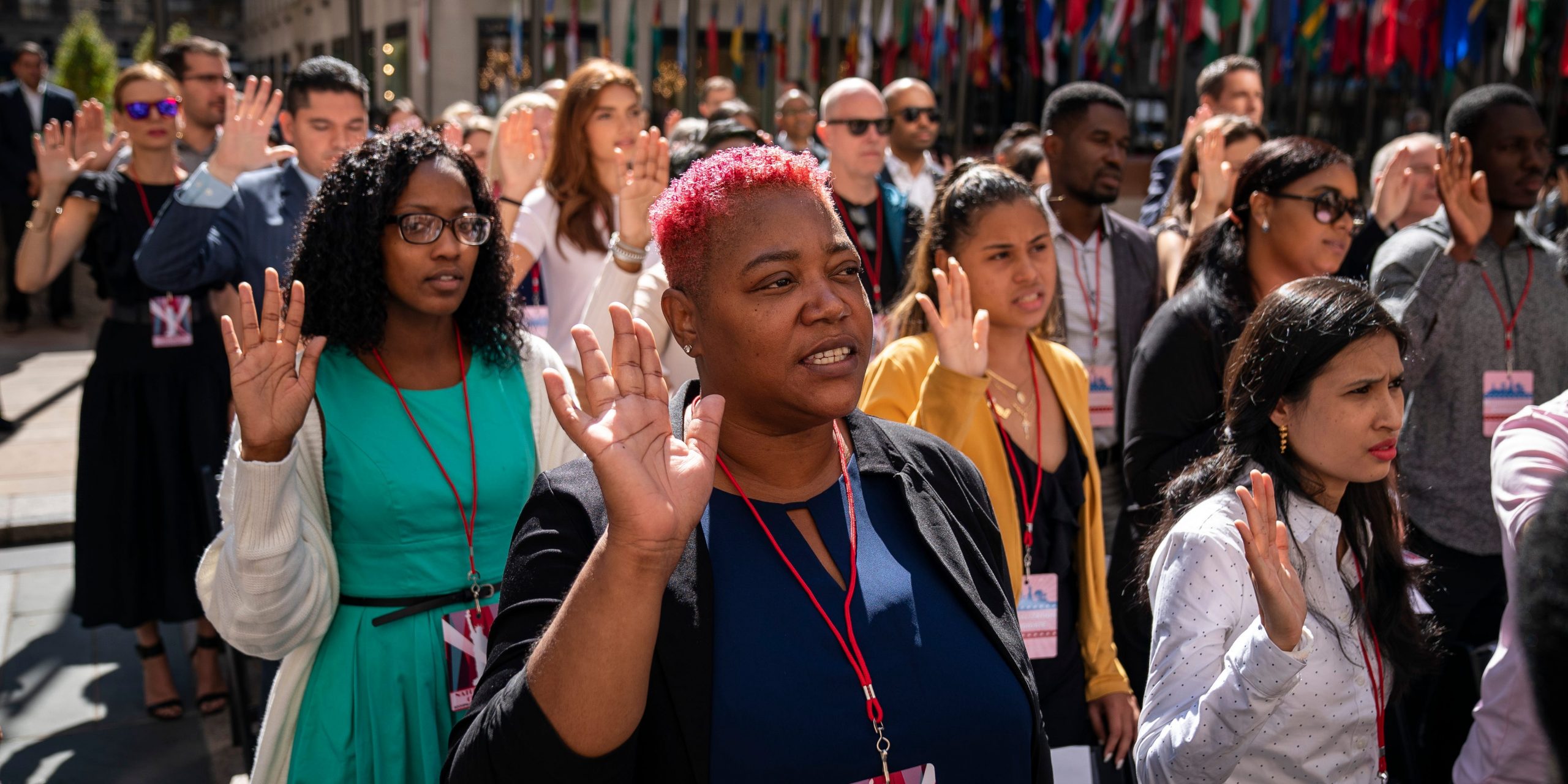
Drew Angerer/Getty Images
- The Vox cofounder’s new book, “One Billion Americans: The Case for Thinking Bigger,” is a somewhat “off the wall” plea for America to think bigger. A lot bigger.
- Yglesias argues for massively increasing the population as the best method to maintain global economic dominance and to keep China from overtaking the US.
- In an interview with Business Insider columnist Anthony Fisher, Yglesias talks about the need for economic dominance, and how immigration and family benefits can help America win.
- They also talk about why Yglesias signed the “infamous Harper’s letter,” which caused a stir in June over free speech and the limits of acceptable discourse, including at Vox.
- Visit Business Insider’s homepage for more stories.
Matt Yglesias is a founder of the newsplainer site Vox, a long-time policy wonk, and a pugilist on Twitter.
He’s also the author of the new book, “One Billion Americans: The Case for Thinking Bigger,” in which he argues for massively increasing the population as the best method to maintain global economic dominance and keep China from overtaking the US.
Yglesias spoke this week by phone with Business Insider columnist Anthony Fisher about new approaches to immigration, using the government to encourage larger families, and holding an election during an economic disaster.
During their conversation, which has been edited for clarity and length, they also talked about why Yglesias signed the “infamous Harper’s letter,” which caused a stir in June over free speech and the limits of acceptable discourse, including at Vox.
Anthony Fisher: More than anything, the book feels like a policy argument in favor of mass immigration. There’s a lot of stuff about encouraging procreation through increasing family benefits, but what’s the elevator pitch for adding 700 million Americans?
Matt Yglesias: The United States is increasingly engaged in a kind of international competition with China. Politicians in both major parties are talking about it. And if you ask yourself, "Why is China a major force on the international stage?," it's primarily because their population is so much larger than ours.
The elevator pitch of the book is, we should try to close that gap, and we should close it by both of the major means available. By doing more to support parents and children here at home and by doing more to accept immigrants from around the world.
There are some questions raised downstream about housing and transportation, and the book is about going through those and showing how we could deal with those problems and emerge, not just as a stronger country in the aggregate, but also a richer, more prosperous, and, in a lot of ways, a more fulfilling country.
Fisher: Why is being a global economic power so closely tied to population?
Yglesias: The Chinese market has grown larger than ours. People can have a wonky debate about purchasing power parity and exchange rates. But I was really struck by a controversy about an NBA executive who tweeted support for the Hong Kong protests. Suddenly the whole league came down on him like a ton of bricks because the China market is so important to the league.
A week or two ago, PEN America came out with a report about how Chinese censors no longer block which movies can be shown in the People's Republic. The China market is so large that Hollywood censors its own movies in accordance with Chinese demands and then shows those censored movies here in the United States.
These are sort of small things. I mean, we're talking movies and basketball. But they go to show that the philosophy of engagement and economic integration with China — that this will all be fine — has really not worked out. Even if you don't posit terrible military confrontations or things like that, the sheer scale of the Chinese economy creates a problem for basic American values.
And being No. 1 matters. Just the extent to which our soft power is suffering from the lack of scale is something that is becoming apparent to more and more of us over the past couple of years.
How to get massive increases in immigration
Fisher: Mass immigration is controversial, especially in the age of Trump, and immigrants are often scapegoated for driving down the wages of low-skilled workers. Even if the data shows that it's only a short-term effect, how do you convince the low-skilled worker they should support mass immigration because it'll work out for them in the long term?
Yglesias: There's a totally reasonable argument that we should try to shift the skill profile of the immigrants that we have. President Trump talks about it. He often doesn't speak that precisely, but he claims that he admires the Canadian and Australian immigration systems.
What he's actually proposing is a 50% cut in legal immigration. But if you look at what they actually do in Canada and Australia, they bias their immigration system heavily toward people with English-language skills, people with college degrees and technical skills, but they accept more immigrants relative to the size of the population than we do.
Not every city likes immigrants or wants immigrants, but there are a lot of mayors of midsize cities that have lost populations because of deindustrialization that would welcome having more foreign-born college graduates coming in. Can we create a system where they can sponsor them?
Instead of having outsourcing work go to India, maybe we could build those facilities in Cleveland. Those companies could be here. Because we see when people get H-1B1 visas, wages go up four- or fivefold relative to what they'd earn abroad. And then companies that receive more H-1B1 visas actually do more hiring of native-born Americans, not fewer, because it's just advantageous to business. You want to grow.
I'm aware of the backlash to immigration. It's something we should take seriously. But we should also take seriously the research about the enormous benefits of immigration. We should try to find places that want more immigrants and find categories of immigrants that we can agree on. Because right now our system is very bureaucratic and there's a lot of arbitrary numerical limits. It's limiting us from being as prosperous as we could be.
Fisher: It seems as if you're arguing for more educated, higher-skilled immigrants.
Yglesias: I'm arguing for ruthless pragmatism on immigration. My read on the situation is that even unskilled immigrants are actually quite beneficial on net. I'm incredibly favorable to immigration, but the political reality is the public is just more skeptical of immigration than they should be. I hope if people read this book, you'll learn a lot about all different kinds of studies, maybe change your mind and think immigration is great. But also we do politics in the real world.
There's pretty good reason to believe that a more upskilled immigration would be more politically supported. People are not that worried about foreign kids with high SAT scores getting into selective American universities, graduating, and then getting white-collar professional jobs here. Maybe we could have open borders with Canada. Is that what worries people about the border, that nice, polite Canadians are streaming down here to hold doors open for us or take advantage of our bad healthcare system? I don't think so. It's about trying to find what works politically to achieve some of the important goals that immigration can facilitate.
Fisher: To be clear, I'm very pro-immigration myself on a policy level. But I often stumble on this argument, because the data says, in the short term, wages could be driven down for native-born Americans by low-skilled immigrant labor coming into the market.
For people looking only at their next paycheck, they don't care about the long-term economic growth of the country. How do you convince them that this thing is only temporary and it won't hurt them in the long run?
Yglesias: It might be necessary, as part of the compromise, to sort of pump the brakes on less-skilled immigration. Unskilled, low-skilled immigration has fallen a lot because there's much less unauthorized immigration. It's not totally clear to me how much people's views of this are driven by reality.
Immigration politics for the past couple of decades has been dominated by the idea of a hard aggregate visa cap. Any idea for creating new visas has to be offset by eliminating some other visas, and that creates political paralysis. Even uncontroversial groups of people, we wind up not creating new visas for them because they'd have to be taken away from somebody else.
Then it gets to be a whole interest-group-politics kind of thing. I'd like to encourage people to just open their minds to a higher target number, and if we have to reshape exactly who it is, who comes as part of that, that's fine. But we should be setting the goal of a larger legal flow of people.
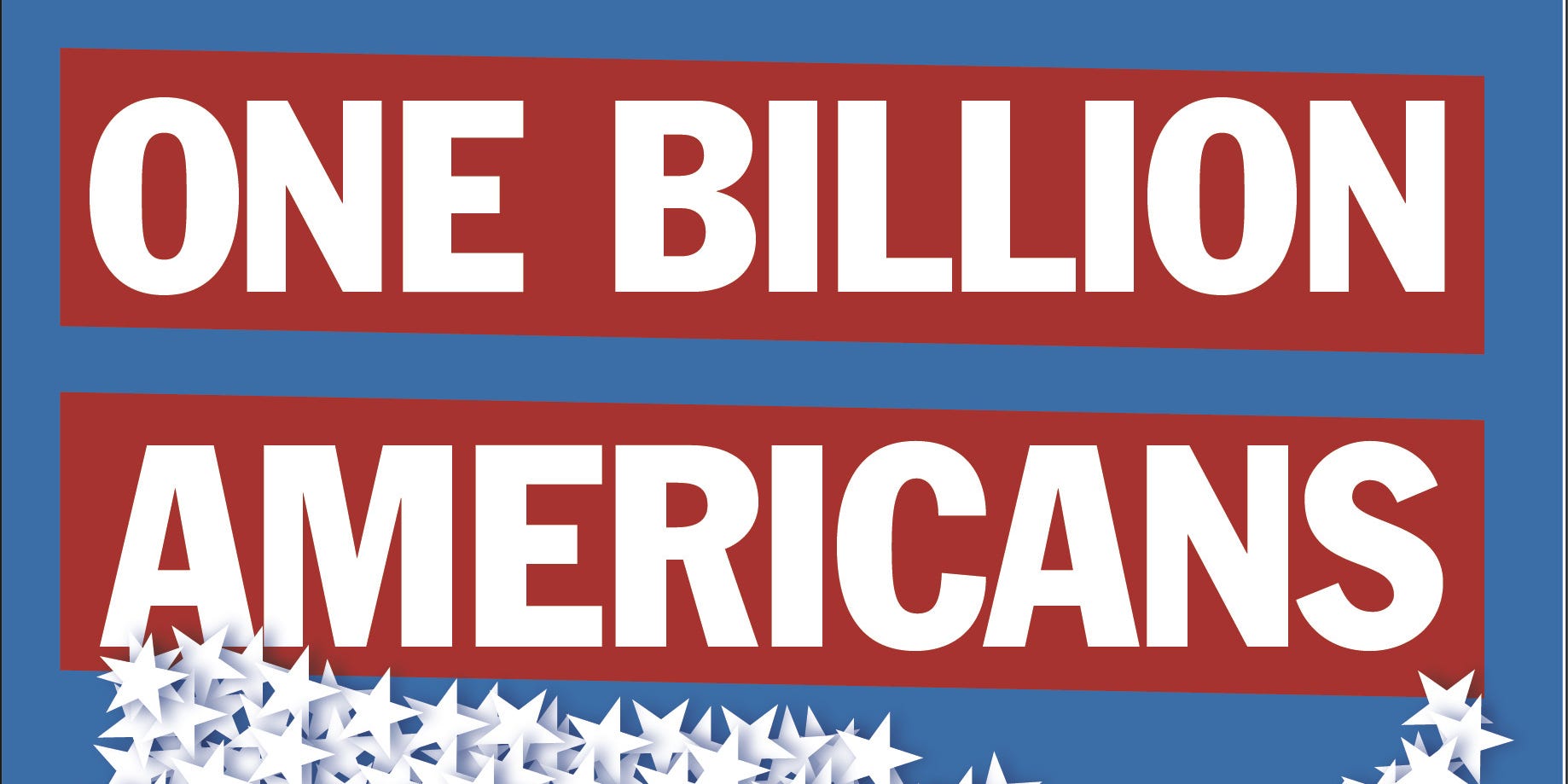
Fisher: You wrote that tripling the population in the lower 48 states would still leave the continental US about half as dense as Germany. But that assumes the population won't just cluster around a few areas. Why would a billion Americans not just create a few hyper-dense supercities, like a bunch of Shanghais?
Yglesias: It might. A big part of the book is about doing more to support people to have more children. I'm not thinking crazy, super-breeding families, but just a little bit more, on average. I've got one kid. I live in the city, in DC. I grew up in Manhattan, so I'm not averse to it. But empirically, a lot of people feel like it's better for various reasons to raise children in lower-density environments. If you had more policy orientation toward family growth, that would, to an extent, pull some people away from the densest cities.
We do know, though, that immigrants like to come to these big port-of-entry cities. There's nothing wrong with that. We should ask ourselves why the New York City metro used to be the biggest city in the world. It was for a long time and now it isn't anymore. And that's not because New York turned bad. We just kind of gave up on growing there. One set of proposals in the book includes changing zoning rules to allow for more housing, and investing in transportation.
Lastly, we should look seriously at trying to decentralize aspects of federal employment and big companies clustering in a couple of cities. We should do an immigration policy to let heartland cities that want more people to accept them. If you have growth, that will be growth in all kinds of communities, at least if we're halfway reasonable about it.
Raising aspirations
Fisher: You write about how the US could ratchet up family benefits that would encourage having more kids. I don't think it's realistic to think the US government is going to move to a European model of months of paid leave and government support. But what could the US realistically do to make it easier for Americans to have more children?
Yglesias: This is not a book about being realistic, politically. This is a book about trying to get people to raise their aspirations.
Right now we have no paid leave. I think reasonable people can disagree about what the right amount of paid leave is. I don't think that reasonable stance is that a parent should spend zero days at home with their newborn child. No one thinks a new mother should spend 36 hours at home with a newborn baby before she goes back on the job. That's ridiculous.
There should be a cash child allowance as they have in every European country. The Trudeau government has introduced one in Canada. We have a kind of facsimile of it in the form of the child tax credit, but the child tax credit has a weird phase-in and then phase-out structure. It's not that generous. I don't like the phasing out, either. I mean, let rich people with kids get some extra money.
American politics has a paranoia about the idea of some rich person somewhere benefiting from a universal social program. Who cares? It's fine. Let's let everybody win.
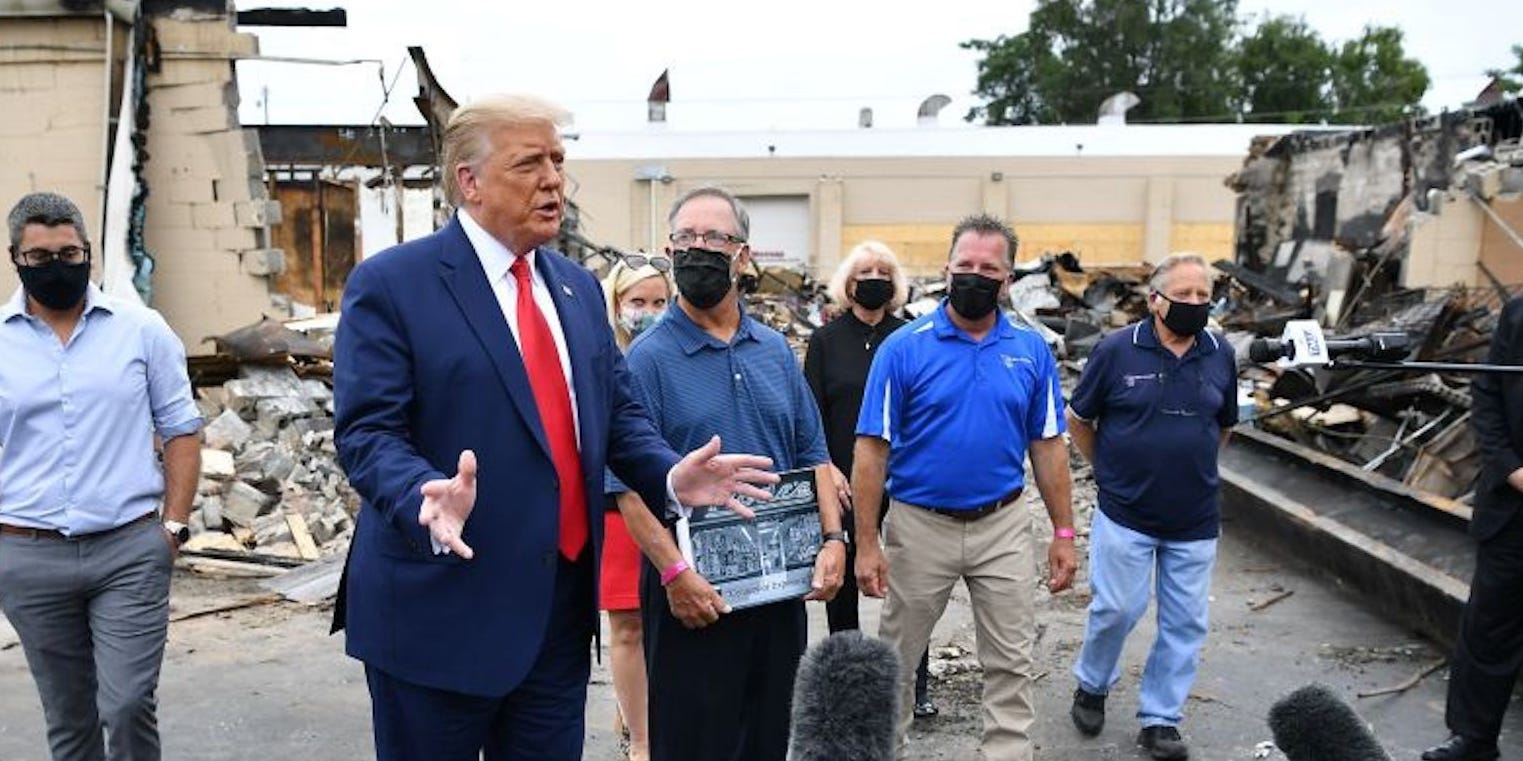
MANDEL NGAN/AFP via Getty Images
Fisher: To move to the election for a minute —
Yglesias: Do you know who's going to win?
Fisher: I do not, and I dare not. We're in the midst of an economic disaster. But it feels as if, at least for the summer, social unrest has been getting far more attention.
I'm not asking you to predict anything, but do you get the sense that voter attention is more focused on the social or economic upheaval?
Yglesias: It's complicated, right? Because in the second quarter we had the worst job and GDP numbers that anyone's ever seen. But then when you dug in on the personal-income statistics, people were actually doing fairly well. We had this kind of economic freak-out paired with actually a lot of people being in OK shape. Now that we're in Q3, it's a little bit of the opposite. People are losing benefits, and there's growing concern about evictions, foreclosures, that kind of thing. But the GDP numbers are really good because businesses are reopening. The stock market is back to record levels. Big international corporations are fine. The pandemic doesn't shut down Google or things like that. People still search on the internet.
On a macro level, the economy is getting better. The thing we need to worry about is that you hit a stall point once the things that can reopen easily have reopened, then you're left with smaller retail things. They can reopen the movie theaters, but I just don't think they're going to be packed, no matter what. We're going to have a problem there unless there's another round of government support.
Fisher: One of the things that the Trump campaign and his supporters have been hitting Biden with is the idea that a vote for the Democrat is essentially a vote for AOC and the democratic socialists, that they're driving the economic policy. Do you get the sense that the party's tacking hard left economically?
Yglesias: I'm old now, but in 2003, when I first came to DC and started covering politics, Nancy Pelosi was considered the leader of the left-wing faction of House Democrats. Now she's the leader of the mainstream faction of House Democrats. And that's not really because she's become more conservative. The party has moved to the left. It has not moved to the AOC left. It's moved to Nancy Pelosi. The presidential nominee was, in the '80s and '90s, considered a liberal Democrat. By the 2020 race, he's considered a moderate Democrat.
The whole point of Barack Obama's vice president being the nominee is that if he becomes president, there's going to be a lot of continuity in terms of personnel, with the people who were running the government in the Obama years. If you found them to be objectionably left wing, you'll think the same about the Biden team. But if you like them, you'll get what you like.
The Harper's letter
Fisher: Earlier this summer, you signed what's now become "the infamous Harper's letter." Can you talk a little about why you chose to sign it?
Yglesias: Is it "infamous"? I guess.
Fisher: I don't think of it as particularly infamous. I just see that descriptor most places where the letter is discussed.
Yglesias: I know. Everybody says it's infamous.
Why did I sign it? Read the text of that letter. It's the most banal, inoffensive thing that you could imagine.
[The Atlantic writer] George Packer and I were emailing something about abolishing the police — which I don't think is a good idea. And then he sent me this letter. No one had ever asked me to sign an open letter before. I was kind of flattered, and I do think the text of that letter is completely solid. When I signed it, I was a little nervous. I was like, "Wow, are they going to make some big deal out of this, and then nobody's going to care because it's so banal?" And instead it became this bizarre, raging controversy. That's what took me by surprise about the whole thing. Now that I've signed an open letter, I don't think I'll be signing any more, because I do think it's better to just speak for yourself.
Fisher: Was there any particular criticism of the letter that you took to heart, or any that you felt was unfair?
Yglesias: When the dialogue around the letter broke out, it made me frustrated because the nature of a letter like that — I did not write in every specific detail and it was cosigned by a whole bunch of people who may have had different things in mind.
I used to be a blogger. I'm an active Twitter user. I like to have an independent voice and I like to speak for myself. And in retrospect, I think that kind of idea, of signing on to things, is maybe a little old fashioned and has gone out of style for good reason.
Fisher: Were you inspired to sign the letter because of any particular things you've seen involving the narrowing of acceptable discourse?
Yglesias: I wrote a piece about David Shor, who's a friend of mine, losing his job. To me, what was disturbing about that incident was not that one person lost his job — because people lose their jobs all the time — but it was the arguments that were mounted, the criticism of him for simply highlighting some academic research that was done by a Black Princeton professor. He faced this torrent of criticism that amounted to saying "You shouldn't say true stuff, if it happens to cut against what some activists are doing at the moment." That made a big impression on me.
I thought that a lot of the dialogue that was taking place in that moment around defunding police, or police abolition, or protest tactics to get police reform police — there was a lot of pressure in the air, so to speak, to not think in rigorous terms about these questions.
Since the time when that letter came out, honestly, I feel a lot better about the situation. I don't think we've seen an escalation of problems in that regard. Maybe the letter was a helpful intervention; maybe it wasn't.
Fisher: It did cause controversy among some of your Vox colleagues. Were there internal warnings or discipline you faced for signing of the letter?
Yglesias: Not really — I mean, no.
Fisher: There was a kind of cryptic tweet you sent to Ezra Klein that seemed to allude that you'd promised to stay mum about this. Is that the case?
Yglesias: What I had promised to do was not conduct disagreements with coworkers in public.
Something that connects my book with some of the speech stuff is, part of my view of the world is that progressive people need to connect on some level with the politics of patriotism.
That doesn't mean denying that terrible things have happened in American history, which they obviously have. Successful politics points to love of country, love of a country's ideals, and tries to highlight aspects of those ideals, aspects of the history that are in line with the values that you want to address. It would be a big mistake for people on the left to just completely cede the idea of American greatness to Donald Trump and to the right.
Even if you look at this book and you're like, "I don't think this thing about commuter rail makes sense" or "I don't really agree with Yglesias about childcare," I think the general exercise of trying to frame arguments about making America greater is a useful and relevant thing. And that the politics of negativism about your own country just doesn't really get you anywhere. It's a bit of a conceptual and political dead end.
Everybody in politics wants to change things. There's nobody who actually runs a campaign saying "Everything is perfect!" But you pick elements of the national mythos that you like, or that are appealing to people, or that support values that are important to you. And you talk about them. You talk about why they matter and what it has to do with the country and its role in the world and things like that.
That is what the book is really about. And the book, which is deliberately a little bit off the wall, connects very directly to the issues that are every day in the headlines.
- Read more
- Culture war is over (if you want it)
- Coronavirus ruined my kids' school year. Trump's response has ruined next year.
- Don't make social-media tech-bro billionaires the arbiters of truth
- Depression doesn't take time off for a pandemic
Dit artikel is oorspronkelijk verschenen op z24.nl






